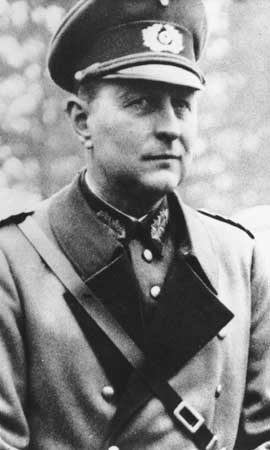General of Panzer Troops Leo Baron Geyr von Schweppenburg was a Catholic, born in 1886, who as a youth was page to Wilhelm II of Württemburg. He was an educated and cultivated man, the friend and protégé of Beck and of von Fritsch, a good linguist in Russian, French and English. He became German military attaché in London, Brussels, and The Hague between 1933 and 1937. He held a low opinion of von Blomberg and of Ribbentrop.
Geyr commanded 3rd Panzer Division as a major-general and then lieutenant-general from 1937 to 1939, and took part in the entry into the Sudetenland in 1938.
In the early days in Russia he commanded XXIV Panzer Corps and made a name as a shrewd and brave leader, narrowly escaping death on more than one occasion. He fought successful actions at Roslavl and in the Krichev area, under Guderian to whom in fact he was senior in rank. The C-in-C of the Army, von Brauchitsch, was, according to Geyr, ‘not very well-disposed’ to him, and as far back as 1928, when Chief of the Army Training Department, had not shown himself particularly appreciative to Geyr’s ideas on Army-Air Force co-operation.
From July 1942 Geyr von Schweppenburg took over Stumme’s XL Panzer Corps operating under Hoth in the drive towards the Caucasus, after fighting successfully in the Staryy Oskol area on the Voronezh front.
From Russia Geyr was recalled to become Inspector of Armour at G. H. Q. and in 1944 he was appointed G. O. C. Panzer Troops West, with headquarters at Paris. He was responsible directly to Colonel- General Guderian for organization and training, and to Field-Marshal von Rundstedt operationally. Geyr supported Rundstedt’s views in the controversy about the disposal of the German tank forces against an enemy landing, and did not subscribe to Rommel’s theory of pushing them right up to the beaches. He favoured holding them in reserve for counter-attacks, partly because he was afraid of massive airborne landings deep in the interior of France. Rommel refers to violent disagreements with Geyr, ‘with whom I recently had to be very rough because he would not give way to my plans’. Nevertheless the two managed to get on, probably because Geyr-a generous man-did not find in Rommel the ‘narrow, inflexible spirit’ that he had deprecated in von Brauchitsch.
In the Normandy battle General Geyr had little chance as Commander, Panzer Group West, to show his undoubted skill. He prepared one counter-attack against the British on 8 June 1944 after Rommel had summoned him from Paris to take over the entire sector east of the Dives to Tilly-sur-Seulles. Allied intelligence discovered the location of Geyr’s headquarters, in an orchard at Le Caine, twelve miles to the south of Caen. Geyr still didn’t fully appreciate the danger from Allied aircraft, and his HQ wasn’t camouflaged. On 10 June the RAF launched a devastating attack on Geyr’s HQ, killing his Chief of Staff and at least 17 other staff officers. Geyr was wounded, but was one of the few survivors. Though Geyr himself and the Chief of Staff of 7th Army, Major-General Max Pemsel, a future C-in-C of the Federal German Army, had lucky escapes, his own Chief of Staff, Major-General Rittler und Edler von Dawans, and most of his senior officers, were killed. All of his wireless trucks and transport was destroyed, and the survivors were so totally isolated that the Seventh Army didn’t learn of the disaster for twelve hours. The planned counterattack was eventually launched by Sepp Dietrich, but the delay meant that it was never as powerful as intended, and it ended in total failure. On 5 July Rommel met Geyr in a forest near St Pierre-sur-Dives to tell him that he had been dismissed. ‘I come to tell you that you have been relieved. Rundstedt has been too; I’m the next on the list,’ said the Field-Marshal.
The air attack knocked Geyr out of the fighting until late June, but once his headquarters had been rebuilt Geyr began to plan for a bigger counterattack, to be carried out by the remains of four Panzer corps. On 28 June Rommel, for unknown reasons, cancelled this attack. This effectively ended Geyr’s military career. Hitler now believed him to be a defeatist, and on 2 July he was replaced by General Eberbach.
General von Geyr survived the war to become an accomplished military historian and commentator. General Dr Hans Speidel had this to say of him: ‘Schweppenburg was an unusual personality, capable in both military and political fields and able to make deductions from experience gathered in the conduct of modern warfare. He had been unswerving and fearless, as military attaché in London, in reporting the increasing isolation of Germany, and those warnings led to his recall’.
Own works
Geyr Von Schweppenburg, Leo. Erinnerungen eines Militarattachés: London 1933–1937. – Stuttgart, Deutsche Verlags-Anstalt, 1949
Geyr Von Schweppenburg, Leo. Die Verteidigung des Westens. – Frankfurt, Verlag Friedrich Rudl, 1952
Geyr Von Schweppenburg, Leo. Die große Frage. – Bernard & Graefe, 1952
Geyr Von Schweppenburg, Leo. The Critical Years. – Allan Wingate, London 1952
